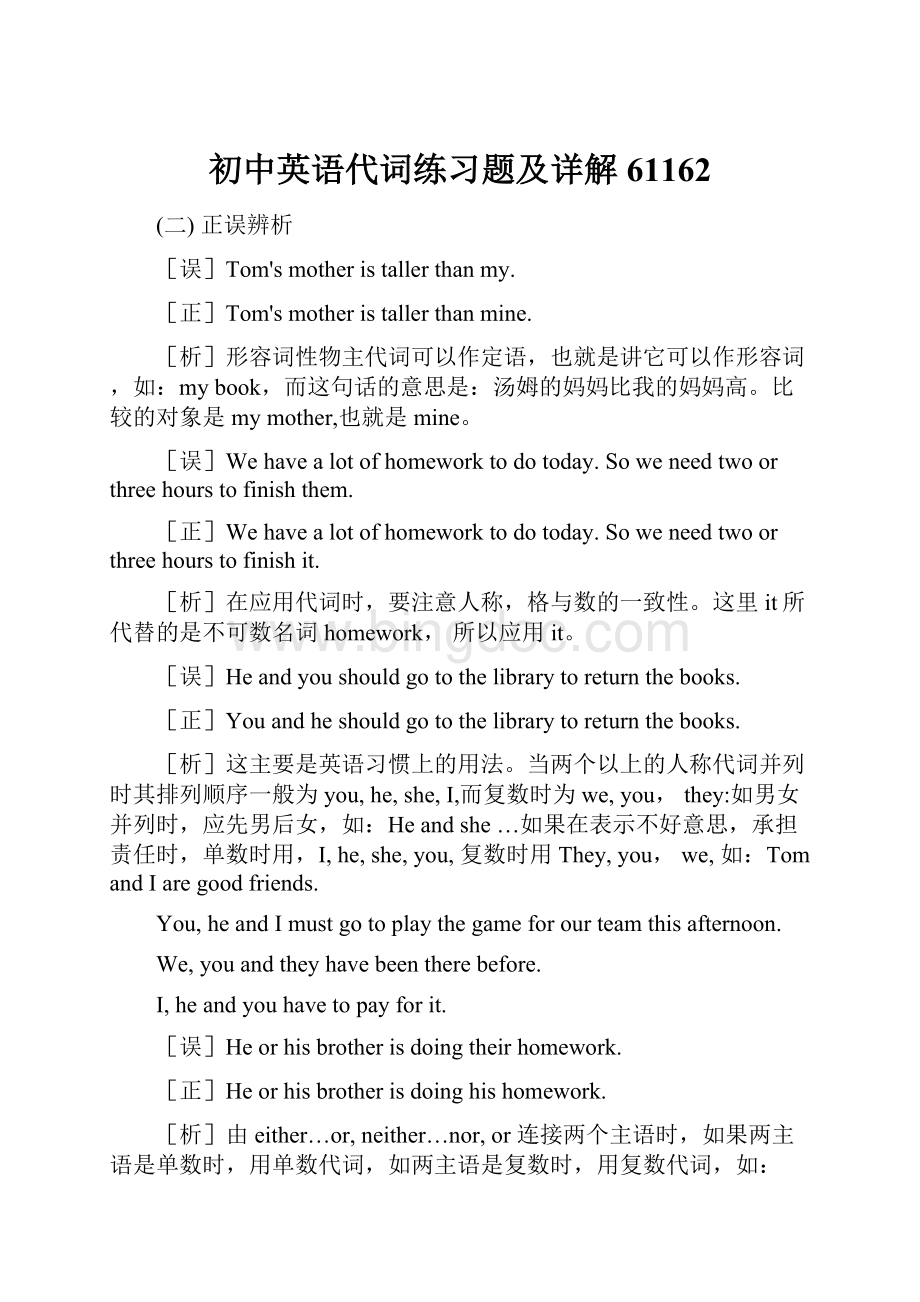初中英语代词练习题及详解61162.docx
《初中英语代词练习题及详解61162.docx》由会员分享,可在线阅读,更多相关《初中英语代词练习题及详解61162.docx(18页珍藏版)》请在冰点文库上搜索。

初中英语代词练习题及详解61162
(二)正误辨析
[误]Tom'smotheristallerthanmy.
[正]Tom'smotheristallerthanmine.
[析]形容词性物主代词可以作定语,也就是讲它可以作形容词,如:
mybook,而这句话的意思是:
汤姆的妈妈比我的妈妈高。
比较的对象是mymother,也就是mine。
[误]Wehavealotofhomeworktodotoday.Soweneedtwoorthreehourstofinishthem.
[正]Wehavealotofhomeworktodotoday.Soweneedtwoorthreehourstofinishit.
[析]在应用代词时,要注意人称,格与数的一致性。
这里it所代替的是不可数名词homework,所以应用it。
[误]Heandyoushouldgotothelibrarytoreturnthebooks.
[正]Youandheshouldgotothelibrarytoreturnthebooks.
[析]这主要是英语习惯上的用法。
当两个以上的人称代词并列时其排列顺序一般为you,he,she,I,而复数时为we,you,they:
如男女并列时,应先男后女,如:
Heandshe…如果在表示不好意思,承担责任时,单数时用,I,he,she,you,复数时用They,you,we,如:
TomandIaregoodfriends.
You,heandImustgotoplaythegameforourteamthisafternoon.
We,youandtheyhavebeentherebefore.
I,heandyouhavetopayforit.
[误]Heorhisbrotherisdoingtheirhomework.
[正]Heorhisbrotherisdoinghishomework.
[析]由either…or,neither…nor,or连接两个主语时,如果两主语是单数时,用单数代词,如两主语是复数时,用复数代词,如:
Eitherteachersorstudentswanttodotheirbesttohelptheoldman.如是一单一复两名词时,一般将单数名词放在前,复数名词放在后,要用复数代词,如:
Theteacherorhisstudentswillcleantheirclassroomtogether.
[误]Hisbrotheristallerthanhim.
[正]Hisbrotheristallerthanhe.
[析]than是连词,其后应视为省略句,thanheis.所以要注意区分其主格与宾格的用法。
Ilikeyouasmuchasshe.
[正]Ilikeyouasmuchasher.
[析]as…as其后也应看作是省略句。
应为asIlikeher.所以应用宾格。
而第一句应译为我像她那样喜欢你。
两句语法都是对的但含义不同。
[误]Myselfdidityesterday.
[正]Imyselfdidityesterday.
[正]Ididitmyselfyesterday.
[析]反身代词不可作主语,但可以用作主语的同位语。
[误]Takecareofourselves.
[正]Takecareofyourselves.(yourself)
[析]祈始句的主语应看作第二人称you.
[误]Pleasebringyourdaughterwithyourself.
[正]Pleasebringyourdaughterwithyou.
[析]反身代词不能作介词宾语,除非是由不及物动词与介词组成的动词短语,如:
Theoldwomanspoketoherself.
[误]Makeyourselfhome.
[正]Makeyourselfathome.
[析]这是英语中的习惯用法,意为“像在家里一样”。
这样的用法还有:
enjoyoneself玩得开心makeyourselfathome像在家中一样
helpyourselftosomething自己拿某物lostoneself迷路
seatoneself就坐dressoneself穿衣
[误]— Who'sthisspeaking.— That'sMary.
[正]— Who'sthatspeaking.— ThisisMary.
[析]在电话用语中,this指讲话人自己,而that指对方。
[误]Thedaysinsummerarelongerthanthisinwinter.
[正]Thedaysinsummerarelongerthanthoseinwinter.
[析]在比较句中往往为了避免重复,可以用that或those取代前面提到的事物,如是单数时用that,复数时用those,如:
TheweatherinBeijingishotterthanthatinChangChun.
[误]Itissoagoodbookthateveryonelikestoread.
[正]Itissuchagoodbookthateveryonelikestoread.
[正]Itissogoodabookthateveryonelikestoread.
[析]在可数名词单数时可用so+形容词+不定冠词+名词+that从句,也可用such+不定冠词+形容词+that从句。
在不可数名词或可数名词复数时,只用such,如:
ItissuchgoodweatherthatIwanttogoswimming.TheyaresuchgoodbooksthatIwanttobuythemall.在many,much,few,little这4个词前仅能用so,如:
Shehassomuchmoneythatshecanbuyeverythingshewants.而在so与that之间仅存形容词时,则不能用such,如:
Sheissosweetthateveryonelikesher.
[误]Iwanttobuyasamedictionaryasyours.
[正]Iwanttobuythesamedictionaryasyours.
[析]same与定冠词the是固定搭配不可更改。
这样的用法还有allthesame(仍然)。
[误]— Ihopeshemightpasstheexam.— Idon'thopeso.
[正]— Ihopeshemightpasstheexam.— Ihopenot.
[析]在作肯定回答时,Ithinkso.Ihopeso.Ibelieveso.但作否定回答时为:
Idon'tthinkso.Ihope/believenot.
[误]— Hestudiedveryhardthisterm.—Soshedid.
[正]—Hestudiedveryhardthisterm.—Sodidshe.
[误]—Englishisdifficulttolearn.—Soisit.
[正]—Englishisdifficulttolearn.—Soitis.
[析]在对话中如果某一动作同时适用于两个主语,这时在答语中要用缩写且要用倒装句。
如第一组句,即studiedhard既适用于he,也适用于she.但答语仅仅是对前句的重复,即仅仅是第一句的缩写时则不要用倒装句。
如第二组句子为:
英语难学。
答语为:
是的,难学。
这时缩写的答语不要用倒装句。
[误]Everyoneshoulddoone'sbest.
[正]Everyoneshoulddohisbest.
[析]one作代词时,它的复数形式是ones,所有格形式是one's,反身代词为oneself.如果讲Oneshoulddoone'sbest.则是对句。
如果one与别的词组成其他词,如:
someone,anyone,everyone或onlyone则要用his/her,来作其所有格形式。
[误]—Whowonthegame—None.
[正]—Whowonthegame—Noone.
[析]由who提问的句子的否定回答中的简略说法是noone,而由Howmany提问的句子的否定回答中的简略语是None.如:
HowmanybooksarethereNone.
[误]Therearemanytreesoneithersidesofthestreet.
[正]Therearemanytreesoneithersideofthestreet.
[正]Therearemanytreesonbothsidesofthestreet.
[析]either作代词时由两个含意,其一是两者中随便哪一个,如:
Youcantakeeither.其二是两者中的每一个。
但要注意的是either后要加单数名词,如果作主语则谓语动词也要用单数形式。
[误]EitheryouorIareright.
[正]EitheryouorIamright.
[析]在either…or,或neither…nor连接两个主语时,其谓语动词要与和其相近的那个主语相配。
[误]Ihavethreesisters.Neitherofthemisadoctor.
[正]Ihavethreesisters.Noneofthemisadoctor.
[析]neither用于两者中无一是,而none则用于多于两者中的人或事物无一是。
[误]Hedoesn'tlikeBeijingopera.Idon'tliketoo.
[正]Hedoesn'tlikeBeijingopera,Idon'tlikeeither.
[析]either作为“也”讲时,要用于否定句中,而too则用于肯定句中。
[误]Welikeboththislittleboy.
[正]Webothlikethislittleboy.
[析]both作同位语时,它在句中的位置有:
在be动词之后,如:
Wearebothstudents.在实意动词之前,如:
Theparentsbothwanttogotothecinema.用于第一助动词之后,如:
WehavebothreadtheseEnglishnovels.使用时要注意以下句子的实际含意:
Bothofusarenotright.应译为:
我们俩不都对。
Neitherofusisright.才应译为:
我俩都不对。
又如:
Ican'tgiveyoubothofthebooks.意为:
两本书我不能全给你,而Ican'tgiveyoueitherofthebooks.才为:
两本书我全不能给你。
[误]Weeachhasaticketfortheconcert.
[正]Weeachhaveaticketfortheconcert.
[析]each作句子主语时其谓语动词要用单数形式,如:
EachofuswantstolearnEnglishwell,但each作同位语时,则应以原名词的数为准。
[误]Everyofushastopasstheexam.
[正]Eachofushastopasstheexam.
[析]every只可作形容词,不可作代词,而each既可作形容词,又可作代词,在作形容词时each侧重强调个体,而every则侧重于全体。
[误]Everyoneofusshoulddohouseworktwohoursaday.
[正]Everyoneofusshoulddohouseworktwohoursaday.
[析]everyone不可与of结构相连接使用,而everyone则可以这样用。
[误]IshouldreadEnglisheveryday.
[正]IshouldreadEnglisheveryday.
[析]要注意的是everyday是“每天”,而everyday则是形容词为“日常的”。
如:
everydayEnglish日常英语,everydaylife日常生活。
[误]Therearetreesoneverysidesofthestreet.
[正]Therearetreesoneachsideofthestreet.
[析]every用于三者或三者以上的每一个,而each用于二者或二者以上的每一个。
因为街道只有两侧,所以只能用each而不能用every.
[误]Allmyparentsareengineers.
[正]Bothmyparentsareengineers.
[析]all用于三者或三者以上的全部,而both则用于两者的全部。
[误]Allofstudentsmightmakesomemistakes.
[正]Allofthestudentsmightmakesomemistakes.
[正]Allstudentsmightmakesomemistakes.
[析]非特指的名词前可用all但不可用allof结构,也就是讲allof结构后面的名词前一定要有定冠词。
其他与all有关的习惯用法还有:
alltheyearround,allweek,allday,allwinter
[误]Theallvillagewasflooded.
[正]Allthevillagewasflooded.
[析]all作修饰语时要用在所有修饰词之前。
[误]Thepostofficeisonothersideofthestreet.
[正]Thepostofficeisontheothersideofthestreet.
[析]单数可数名词如在泛指某一个时用another,而特指时则要用theother,因街道只有两边,而不在这边必定是在另一边,所以要用特指。
请参考下表的用法以便于记忆。
单数复数
泛指another形容词作定语作名词
another代词otherothers
特指theother形容词
theother代词
theothertheothers
[误]TherearetenstudentshereWherearetheothersstudents
[正]Therearetenstudentsaretheothers
[正]TherearetenstudentshereWherearetheotherstudents
[析]theothers=theotherstudents.
[误]Theoldmanhastwosons.Oneisateacher,anotherisadoctor.
[正]Theoldmanhastwosons.Oneisateacher,theotherisadoctor.
[析]another用于泛指,如:
IsitfarfromheretothestationI'msorry.Ihavenoidea.Onemaysayitisquitenear;anothermaysayitisfarfromhere.但在特指时则要用theother.它可以用作定语,theotherone,也可以用作代词theother,但theother用作代词时它的含意一定是单数。
如果指三者或者三者以上的情况时,则要用one…another…theother.或者one…asecond…thethird…
[误]Somepeoplelikesports.Theotherslikereading.
[正]Somepeoplelikesports.Otherslikereading.
[析]在泛指的复数名词前用some…others…others…来表示某些人……某些人……某些人……。
[误]Pleaseremembertowatertheflowerseachotherday.
[正]Pleaseremembertowatertheflowerseveryotherday.
[析]everyotherday为每隔一天。
是习惯用法,不要随意改动。
又如:
ontheotherhand另一方面。
[误]Manyknowhim,butfewlikeshim.
[正]Manyknowhim,butfewlikehim.
[析]few用于可数名词,意为几乎没有,但few作主语时谓语动词则要用复数形式,而afew为有一些。
[误]Youhavefewfriends,haven'tyou
[正]Youhavefewfriends,haveyou
[析]little与few用于句中时,均要按否定句看待。
[误]Muchofwhatyousaidaretrue.
[正]Muchofwhatyousaidistrue.
[析]much用于不可数名词,作主语时用单数谓语动词。
而many用于可数名词,它作主语时用复数形式的谓语动词。
[误]Thisroomisenoughlargeforthestudentstolivein.
[正]Thisroomislargeenoughforthestudentstolivein.
[析]enough可以用作代词,如:
Thereisenoughofthefood.又如:
Enoughhasbeendoneforthework,但enough还可以作形容词来修饰名词,这时enough可以放在名词之前,也可放在名词之后,如:
moneyenough与enoughmoney都是对的。
但当enough作副词修饰形容词时,则只能置于形容词之后了。
[误]Iwantanybookstoread.Doyouhaveany
[正]Iwantsomebookstoread.Doyouhaveany
[析]按照语法any用于疑问句和否定句,而some用于肯定句。
[误]Wouldyoulikeanythingtodrink
[正]Wouldyoulikesomethingtodrink
[析]在由wouldyoulike发出的问句中,表达了说话者真心实意要为对方提供些饮料,或在说话者想得到对方的肯定答复时,在疑问句中要用some而不用any。
[误]Someonewanttomeetyou.
[正]Someonewantstomeetyou.
[析]不定代词应被看作单数,即使用and连接两个不定代词,也要看作单数,如:
Anyoneandeveryonehastheright.任何人,每一个人都有这样的权力。
[误]NewYorkismuchcolderinwinterthanbefore.
[正]ItismuchcolderinNewYorkinwinterthanbefore.
[析]it常常用在英文的句子中来代表时间、距离、天气、自然现象,或用在句中作形式主语或宾语,如:
Itisteno'clocknow.(代时间)
Itisfarfromheretotheairport.(代距离)
Itisveryhot.(代天气)
ItisverydifficulttolearnEnglishwell.(作形式主语)
Wefounditverydifficulttoanswerthequestion.(作形式宾语)
[误]Becareful.Don'tdrinktoomany.
[正]Becareful.Don'tdrinktoomuch.
[析]这里much所代的应是饮料或水,所以应为不可数名词。
(三)例题解析
1Theseare___books.Yoursareoverthere.
AIBmyCmeDmine
[答案]B.
[析]这里应用形容词性物主代词。
2—___isshe
—Sheisateacher.
AWhatBHowCWhoDWhere
[答案]A.
[析]这里的四个疑问词放在问句中全都成立,但其意义不同。
Whatisshe应译为“她的工作是什么”或“她是做什么的”而Howisshe应译为“她身体如何”而Whoisshe应译为“她是谁”其答语应为“她叫什么名字。
”而Whereisshe应为“她在什么地方”由答语决定了这道题的选择。
3___iswrongwithmywatch.Ithasstopped___.
ASomething,workingBSomething,towork
CAnything,workingDAnything,towork
[答案]A.
[析]因为是肯定句所以应用Something,其后由于表停止工作了,则stop后要用动名词。
4Mary,help___tothebananas,please.
AyouByourCyourselfDyourselves
[答案]C.
[析]helponeselftosomething为“自己拿某物”。
yourself为“你一个人”,而yourselves为“你们”。
5—___doyougotoschooleveryday
—Bybus.
AHowBWhyCWhenDWhere
[答案]A.
[析]这题的答案是